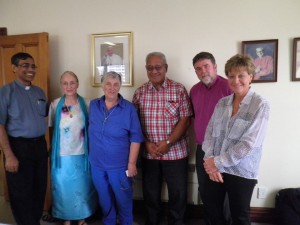CCA Applauds the New Ecumenical Initiative of Churches in Aotearoa, New Zealand
[caption id="attachment_1678" align="aligncenter" width="512"] The Executive Committee of NDCU - from right, the Rev. Anne Mills, Most Rev. Philip Richardson (Chairperson) Rev. Rex Nathan (Treasurer), Ms. Pat Lythe , Rev. Cornelia Grant , and Rev. Prince Devanandan (Secretary)[/caption]
The Executive Committee of NDCU - from right, the Rev. Anne Mills, Most Rev. Philip Richardson (Chairperson) Rev. Rex Nathan (Treasurer), Ms. Pat Lythe , Rev. Cornelia Grant , and Rev. Prince Devanandan (Secretary)[/caption]
The Christian Conference of Asia (CCA) applauded the initiative of Aotearoa New Zealand churches to constitute a national ecumenical platform, the National Dialogue for Christian Unity (NDCU) in the country.
Representatives of the Anglican, Methodist and Roman Catholic Churches assembled in Wellington on 25th February 2016 and established the new national ecumenical body, NDCU. The inaugural meeting of NDCU was held at the Sacred Heart Cathedral followed by a service of celebration. The three churches ratified the constitution of NDCU, and accepted a theological statement on Unity. The Presbyterian Church of New Zealand and the Salvation Army have chosen to remain with observer status in NDCU.
In a congratulatory message conveyed to the officers of the newly constituted NDCU, the general secretary of CCA, Dr. Mathews George Chunakara stated that the “Christian Conference of Asia warmly welcomes the new initiative of Aoteoroa New Zealand Churches to reactivate the national ecumenical platform where all Christian churches in the country will find their space to be engaged in common Christian witness and action in unity."
“The churches in Aotearoa New Zeland had played an active role in the Asian and global ecumenical movement for decades, although some churches are rather less enthusiastic in recent times in engaging themselves in wider ecumenical involvements. However, it is our fervent prayer and hope that the newly constituted national ecumenical organization will be instrumental in reactivating the spirit of ecumenism and united witness ”, added the CCA General Secretary.
Conference of Churches of Aotearoa New Zealand, the previous national ecumenical organization in the country, was a member of the Christian Conference of Asia, became defunct ten years ago.
The office-bearers of the NDCU are Archbishop Philip Richardson (Anglican), Rev. Prince Devanandan (Secretary), Rev. Rex Nathan (Treasurer) and Pat Lythe, Anne Mills and Cornelia Grant (executive committee members).
Rev. John Roberts, who facilitated the constituent bodies’ meeting, traced the recent history of the ecumenical movement in the country and challenged church leaders with a caution, “not to repeat mistakes of the past”. He said, “failure to hold together faith and order issues with concern for social justice was a fundamental weakness of the previous ecumenical body which became defunct.”










